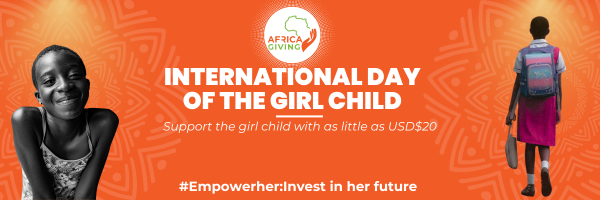What will it take to give?
Tendai Murisa
We are entering the school examination season in Zimbabwe and in many other African countries. My daughter is busy preparing for her first examinations, and we are all nervous in the house. When she asked me to buy a mathematical set, I literally failed to settle on one. Ended up buying three different ones for her and the teacher to choose which one would work best. But something else hit me, and the word is ‘privilege’. Back in the days when I was at school, many couldn’t afford a Mathematical set. Could there be another child today who doesn’t know where to get a Mathematical set- I suppose so. Could our collective giving help resolve this problem? For the record, Mathematical sets retail at around $2.50, thanks to Chinese mass production models. I suspect that learners in rural areas may struggle to access these. How can our giving be a solution?

“The act of giving is part of our DNA.”
This is a claim I hear in many workshops and discussions, especially amongst my African colleagues. However, when I ask them to list causes they support, very few. We have the language and the tools, but we rarely use them. In many instances, our giving is confined to family circles. That is well and good, but these are usually family obligations. I am here to discuss giving within a community, or let me be bold enough and say giving to strangers. That’s what we mean by philanthropy. You were always going to give to your family members. Giving to your church or mosque can count as philanthropy. I will address the church and Mosque in a separate blog at some point. Our baseline data (with an initial focus on Zimbabwe) stated that over 70% of respondents reported giving, and the biggest cause or recipient was the church, with 64% of respondents indicating they gave to religious institutions.
What will it take to give to strangers?
Across Africa, the need for support stares at us throughout the day, at the traffic lights, at the shops, and even at our gates. I have a friend who moves around with loose change to give as and when asked. Many of us have been moved by compassion and given under similar circumstances. However, nothing has changed, the same person we gave to at the corner is still there, or they have moved to a new corner. In many instances, this kind of giving helps to cleanse the soul of the giver. How do we scale our giving towards achieving impact? We need to first realise that our individual gifts can only do so much; on their own, they don’t move the needle or create adequate impact. The levels of need within our societies are huge and require more than feel-good giving.
In the past, we were told that there were no platforms that allowed individuals to give in a concerted manner. We bought into that argument and, together with others, built several platforms aimed at creating the ease of giving and tracking the impact of one’s gift. My organisation (SIVIO Institute) has been running an individual giving platform called AfricaGiving (www.africagiving.org) since 2023, but this is just one amongst many other platforms. Our friends at Higherlife Foundation have recently built and deployed theirs called RemitHope, an innovative gift matching platform. They have committed to matching any amount given.
However, despite the proliferation of giving platforms, we are yet to build the momentum that matches the needs on the ground. Yet, unlike other regions, Africa’s wealth is distributed across a growing middle class and the ever-increasing dollar millionaires. The latter has opened several foundations across the continent, but that is also not sufficient. The need remains. Our hypothesis for transformation is that it will take all of us to move the needle on poverty and inequality. Not just a select few millionaires but all of us. Hence, the need to increase the number of those who can give small gifts consistently.
How do we proceed?
Mindset shift
I have a very close friend. He is a specialist Doctor and is based in the Diaspora. My friend called me the other day, lamenting the poor state of the bridge on the roads towards their village. He wanted to know if I knew an NGO that could fix the bridge. I suggested that instead of looking for an NGO, maybe he could reach out to others from the same village and see if they could provide resources to do this work. His response was quick- that will take a lot of time, besides, there are organisations set out to do this work. Would you blame him, though? That is our mindset at times. I remember way back at the onset of the COVID-19 virus, we came together to help fix two hospitals in Harare and Bulawayo. Others asked- why were we committing to do the government’s work? They were right. But the government was not doing it. Someone should do this work. What will it take, though, to shift from spectators or rather demanders of services to being providers? Some will argue that it’s the government’s duty to do it, and our role should be to demand services. I respect that, and a fun fact, 50% of my work is focused on making sure that governments are responsible and accountable to their citizens. The real risk is that we (citizens) will continue to ask/demand services and officeholders will continue to promise delivery, whilst nothing happens. Our quality of life continues to deteriorate. Let’s be the change that we want to see.
Invest in Collaborative Efforts. What if we are the answer?
It always looks like it’s too big at the beginning. But when we consider our numbers and break down whatever undertaking into its individual constituent parts, we begin to see glimpses of possibilities. We need to activate our collective sense of agency rather than being victims. Let’s assume, for instance, that there is a rural school where there are 200 learners in need of Mathematical sets. That means $200*2.50=$500. Do the Math, if there are 5 of us, or what if there are 10 of us? That’s how we fix problems within our communities. One problem at a time.

We are currently running a campaign to celebrate the Day of the Girl Child via our www.africagiving.org platform. The idea is to contribute towards reducing the number of days that a girl child misses school because of period poverty. Data has shown that girls are more likely to miss more school days than boys for a variety of reasons, including the lack of sanitary pads during their monthly menstrual cycle. Surely, we can all play a part in reducing this.
Resolve the Trust Deficit
In many instances, those who want to give do not know where to start, that is, who to give to, and if the recipient will be able to channel the gift to the eventual and deserving beneficiaries. First, we need to bridge the trust deficit. We are a low-trust society. We have, since the launch of the platform, invested in making sure that the listed organisations develop mechanisms for building trust. These mechanisms include regular updates to givers on how their donations are being utilised and, where possible, personal testimonies from the actual beneficiaries. Furthermore, most of the listed organisations go through regular audits.
Regular Donations
Campaigns, like the one we are currently running, are fun, but they are not adequate. We use them as an opportunity to develop momentum or cast a spotlight on a particular public problem. We need regular small gifts from as many individuals as possible to really move the needle on the challenges we face. There is power in numbers-if 100 of us came together to give donations of US$10 each per month, imagine what we could do to fix problems such as period poverty and help improve school attendance amongst girls.
The change we want to see will start with us.
